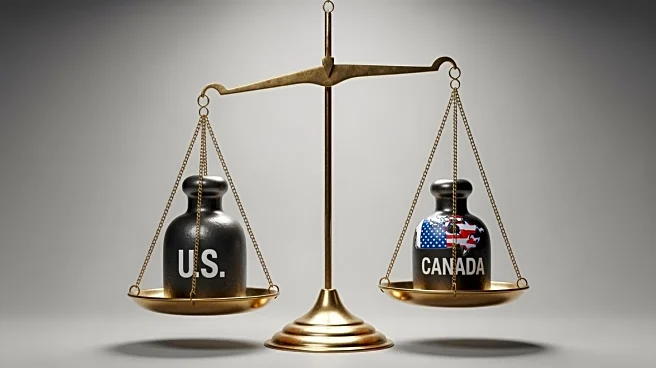What's Happening?
President Trump announced a 10% increase in tariffs on Canadian goods, escalating trade tensions between the U.S. and Canada. The decision follows an anti-tariff advertisement aired by Ontario, which featured
former President Ronald Reagan's speech against tariffs. Trump criticized the ad as a 'fraud' and accused Canada of misrepresenting Reagan's views. The ad was broadcast during the World Series, prompting Trump to terminate trade talks with Canada. Ontario Premier Doug Ford agreed to pause the ad campaign, but it will continue over the weekend. The tariffs affect key Canadian exports, including autos, steel, and aluminum.
Why It's Important?
The tariff increase could have significant economic repercussions for both countries. Canada, one of the U.S.'s largest trading partners, relies heavily on exports to the U.S., and the tariffs could exacerbate economic challenges, including rising unemployment. For the U.S., the tariffs may lead to higher prices for imported goods, affecting consumers and businesses. The move also highlights the fragility of international trade relations and the potential for political disputes to impact economic policies. The situation underscores the importance of diplomatic engagement and the need for clear communication between trading partners.
What's Next?
The tariff increase is likely to strain U.S.-Canada relations further, with potential implications for future trade negotiations. Canadian Prime Minister Mark Carney and President Trump are both attending the ASEAN summit in Malaysia, but Trump has indicated he will not meet with Carney. The ongoing trade tensions may prompt Canada to seek alternative markets or strengthen ties with other trading partners. In the U.S., businesses and industry groups may lobby for a resolution to avoid disruptions in supply chains. The situation remains fluid, and stakeholders will need to monitor developments closely.
Beyond the Headlines
The dispute over the Reagan ad highlights the role of media and public perception in shaping international relations. It raises questions about the use of historical figures and their legacies in contemporary political debates. The situation also reflects broader challenges in balancing national interests with global economic integration. As countries navigate these complexities, there is a need for thoughtful policy-making that considers both short-term impacts and long-term strategic goals.











